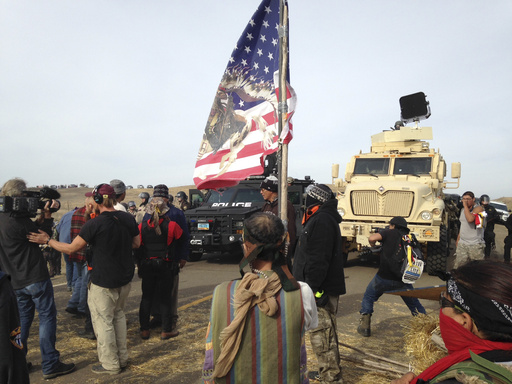MANDAN, N.D. — A legal battle initiated by a Texas pipeline firm against Greenpeace for defamation and alleged disruptions during demonstrations against the Dakota Access Pipeline is set to begin in North Dakota on Monday. This case is being viewed by Greenpeace as a significant threat to free speech and the organization’s ongoing operations.
The lawsuit originates from protests that took place in 2016 and 2017 regarding the pipeline’s proposed crossing of the Missouri River, located near the Standing Rock Sioux Tribe’s territory. The tribe has expressed concerns that the pipeline endangers their water resources. Among the many demonstrators, hundreds were arrested during these events.
Energy Transfer, along with its subsidiary Dakota Access, accuses Greenpeace International, based in the Netherlands, and the U.S. branch, Greenpeace USA, of offenses such as trespassing, nuisance, and defamation. The lawsuit also includes the Greenpeace Fund Inc., which serves as the group’s funding mechanism.
The trial, taking place in a North Dakota state court in Mandan, is projected to last for up to five weeks.
Energy Transfer claims that Greenpeace engaged in tactics to disrupt the pipeline’s construction, spread false information about the companies involved, and coordinated acts of vandalism and violence among demonstrators. The company is seeking millions of dollars in damages.
The Dakota Access Pipeline has been operational since June 2017, transporting oil across various regions.
Greenpeace International contends that it should not be part of the lawsuit, stating that it is separate from its American affiliates, does not operate within the U.S., and that none of its staff members participated in the protests. Greenpeace USA argues that the allegations put forth have not been substantiated over the years since the events took place. In February, a judge denied motions from Greenpeace to dismiss or limit certain aspects of the case.
Greenpeace representatives, who have been active for over five decades, argue that the lawsuit aims to stifle dissent against the oil sector. They assert that this trial represents a vital test of First Amendment rights, particularly concerning free speech and the ability to protest peacefully, especially during the current political climate. According to Sushma Raman, Interim Executive Director of Greenpeace USA, “A negative verdict in this case could jeopardize our freedoms, impacting journalists, protestors, and anyone aiming to engage in public discourse.”
Greenpeace USA emphasized their involvement in providing training for nonviolent protest strategies during the demonstrations, noting that Energy Transfer’s stance suggests that any involvement in protest training would render an individual liable for the actions of all participants.
In response to these actions, Greenpeace International has filed a separate anti-intimidation lawsuit in Amsterdam, arguing that Energy Transfer has acted inappropriately and that it should cover the legal costs arising from what they describe as “meritless” litigation.
On the other hand, Energy Transfer maintains that the lawsuit is fundamentally about adherence to the law, rather than free speech. Vicki Granado, a spokeswoman for Energy Transfer, stated that they respect the rights of Americans to express their views and protest legally, however, actions that violate laws should be addressed through the legal system. The company previously filed a similar suit in federal court in 2017, which was dismissed in 2019, leading to the current state court case.
Since its inception in 1996 with a small workforce and limited pipeline infrastructure, Energy Transfer has grown significantly. Now, it employs 11,000 individuals and manages over 125,000 miles of pipeline and related facilities.




